四年级英语常见的疑问句
- 格式:ppt
- 大小:283.50 KB
- 文档页数:8
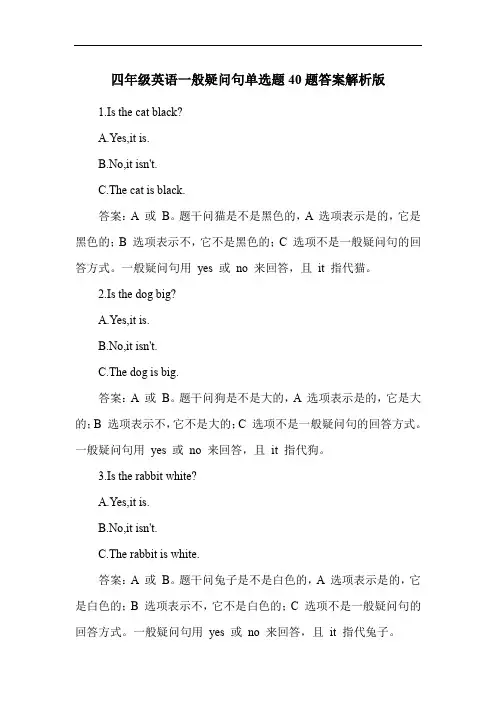
四年级英语一般疑问句单选题40题答案解析版1.Is the cat black?A.Yes,it is.B.No,it isn't.C.The cat is black.答案:A 或B。
题干问猫是不是黑色的,A 选项表示是的,它是黑色的;B 选项表示不,它不是黑色的;C 选项不是一般疑问句的回答方式。
一般疑问句用yes 或no 来回答,且it 指代猫。
2.Is the dog big?A.Yes,it is.B.No,it isn't.C.The dog is big.答案:A 或B。
题干问狗是不是大的,A 选项表示是的,它是大的;B 选项表示不,它不是大的;C 选项不是一般疑问句的回答方式。
一般疑问句用yes 或no 来回答,且it 指代狗。
3.Is the rabbit white?A.Yes,it is.B.No,it isn't.C.The rabbit is white.答案:A 或B。
题干问兔子是不是白色的,A 选项表示是的,它是白色的;B 选项表示不,它不是白色的;C 选项不是一般疑问句的回答方式。
一般疑问句用yes 或no 来回答,且it 指代兔子。
4.Is the bird blue?A.Yes,it is.B.No,it isn't.C.The bird is blue.答案:A 或B。
题干问鸟是不是蓝色的,A 选项表示是的,它是蓝色的;B 选项表示不,它不是蓝色的;C 选项不是一般疑问句的回答方式。
一般疑问句用yes 或no 来回答,且it 指代鸟。
5.Is the monkey cute?A.Yes,it is.B.No,it isn't.C.The monkey is cute.答案:A 或B。
题干问猴子是不是可爱的,A 选项表示是的,它是可爱的;B 选项表示不,它不是可爱的;C 选项不是一般疑问句的回答方式。
一般疑问句用yes 或no 来回答,且it 指代猴子。
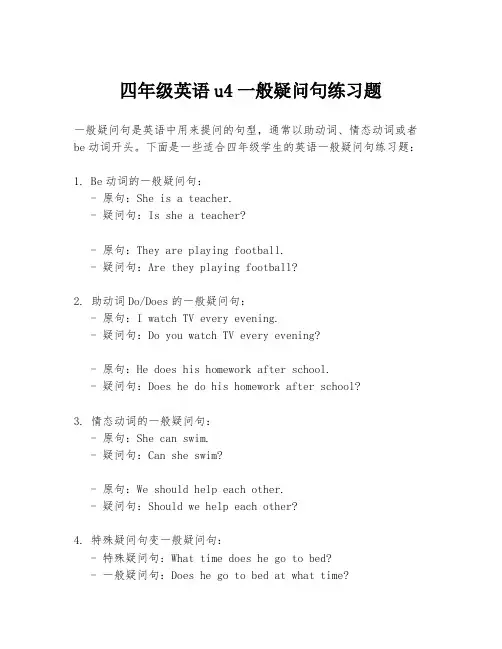
四年级英语u4一般疑问句练习题一般疑问句是英语中用来提问的句型,通常以助动词、情态动词或者be动词开头。
下面是一些适合四年级学生的英语一般疑问句练习题:1. Be动词的一般疑问句:- 原句:She is a teacher.- 疑问句:Is she a teacher?- 原句:They are playing football.- 疑问句:Are they playing football?2. 助动词Do/Does的一般疑问句:- 原句:I watch TV every evening.- 疑问句:Do you watch TV every evening?- 原句:He does his homework after school.- 疑问句:Does he do his homework after school?3. 情态动词的一般疑问句:- 原句:She can swim.- 疑问句:Can she swim?- 原句:We should help each other.- 疑问句:Should we help each other?4. 特殊疑问句变一般疑问句:- 特殊疑问句:What time does he go to bed?- 一般疑问句:Does he go to bed at what time?5. 否定形式的一般疑问句:- 原句:They don't like apples.- 疑问句:Don't they like apples?6. 回答一般疑问句:- 问题:Is your father a doctor?- 肯定回答:Yes, he is.- 否定回答:No, he isn't.7. 选择疑问句:- 问题:Do you want to play basketball or soccer?- 回答示例:I want to play basketball.8. 含有some和any的一般疑问句:- 问题:Would you like some juice or milk?- 回答示例:I would like some juice.9. 含有频率副词的一般疑问句:- 问题:How often do you visit your grandparents?- 回答示例:I visit them every weekend.10. 含有there be结构的一般疑问句:- 问题:Is there a book on the table?- 回答示例:Yes, there is.这些练习题可以帮助学生熟悉一般疑问句的构成和回答方式,通过不断的练习,学生可以更加自如地使用英语进行日常交流。
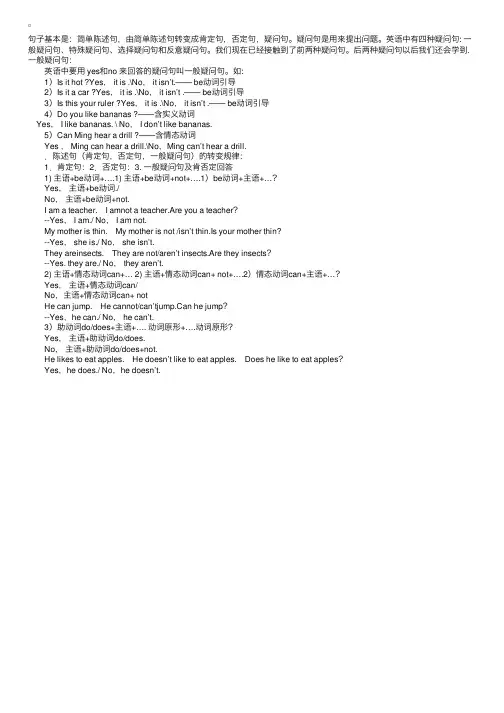
句⼦基本是:简单陈述句,由简单陈述句转变成肯定句,否定句,疑问句。
疑问句是⽤来提出问题。
英语中有四种疑问句: ⼀般疑问句、特殊疑问句、选择疑问句和反意疑问句。
我们现在已经接触到了前两种疑问句。
后两种疑问句以后我们还会学到.⼀般疑问句: 英语中要⽤ yes和no 来回答的疑问句叫⼀般疑问句。
如: 1)Is it hot ?Yes, it is .\No, it isn’t.—— be动词引导 2)Is it a car ?Yes, it is .\No, it isn’t .—— be动词引导 3)Is this your ruler ?Yes, it is .\No, it isn’t .—— be动词引导 4)Do you like bananas ?——含实义动词 Yes, I like bananas. \ No, I don’t like bananas. 5)Can Ming hear a drill ?——含情态动词 Yes , Ming can hear a drill.\No,Ming can’t hear a drill. .陈述句(肯定句,否定句,⼀般疑问句)的转变规律: 1.肯定句:2.否定句:3. ⼀般疑问句及肯否定回答 1) 主语+be动词+….1) 主语+be动词+not+….1)be动词+主语+…? Yes,主语+be动词./ No,主语+be动词+not. I am a teacher. I amnot a teacher.Are you a teacher? --Yes, I am./ No, I am not. My mother is thin. My mother is not /isn’t thin.Is your mother thin? --Yes, she is./ No, she isn’t. They areinsects. They are not/aren’t insects.Are they insects? --Yes. they are./ No, they aren’t. 2) 主语+情态动词can+… 2) 主语+情态动词can+ not+….2)情态动词can+主语+…? Yes,主语+情态动词can/ No,主语+情态动词can+ not He can jump. He cannot/can’tjump.Can he jump? --Yes,he can./ No, he can’t. 3)助动词do/does+主语+…. 动词原形+….动词原形? Yes,主语+助动词do/does. No,主语+助动词do/does+not. He likes to eat apples. He doesn’t like to eat apples. Does he like to eat apples? Yes,he does./ No,he doesn’t.。
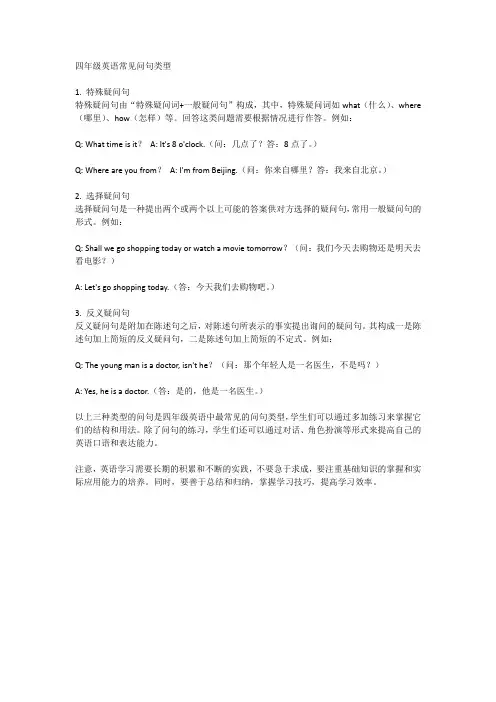
四年级英语常见问句类型1. 特殊疑问句特殊疑问句由“特殊疑问词+一般疑问句”构成,其中,特殊疑问词如what(什么)、where (哪里)、how(怎样)等。
回答这类问题需要根据情况进行作答。
例如:Q: What time is it?A: It's 8 o'clock.(问:几点了?答:8点了。
)Q: Where are you from?A: I'm from Beijing.(问:你来自哪里?答:我来自北京。
)2. 选择疑问句选择疑问句是一种提出两个或两个以上可能的答案供对方选择的疑问句,常用一般疑问句的形式。
例如:Q: Shall we go shopping today or watch a movie tomorrow?(问:我们今天去购物还是明天去看电影?)A: Let's go shopping today.(答:今天我们去购物吧。
)3. 反义疑问句反义疑问句是附加在陈述句之后,对陈述句所表示的事实提出询问的疑问句。
其构成一是陈述句加上简短的反义疑问句,二是陈述句加上简短的不定式。
例如:Q: The young man is a doctor, isn't he?(问:那个年轻人是一名医生,不是吗?)A: Yes, he is a doctor.(答:是的,他是一名医生。
)以上三种类型的问句是四年级英语中最常见的问句类型,学生们可以通过多加练习来掌握它们的结构和用法。
除了问句的练习,学生们还可以通过对话、角色扮演等形式来提高自己的英语口语和表达能力。
注意,英语学习需要长期的积累和不断的实践,不要急于求成,要注重基础知识的掌握和实际应用能力的培养。
同时,要善于总结和归纳,掌握学习技巧,提高学习效率。
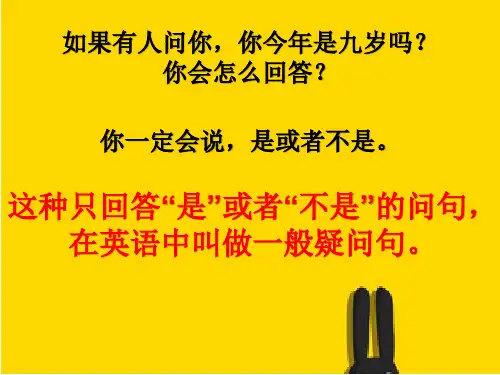
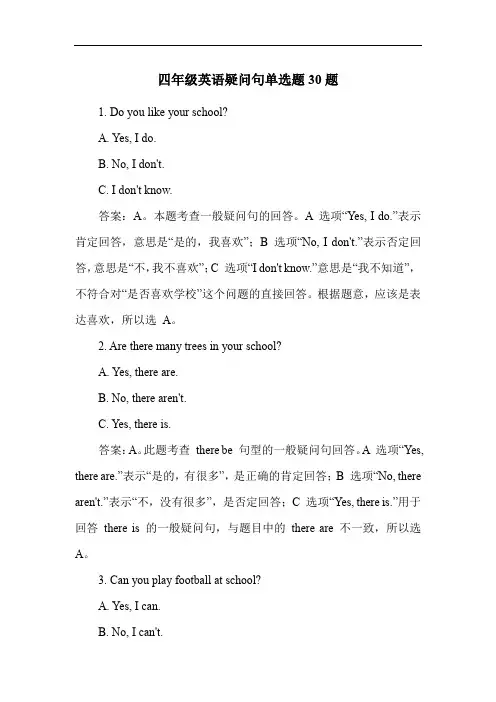
四年级英语疑问句单选题30题1. Do you like your school?A. Yes, I do.B. No, I don't.C. I don't know.答案:A。
本题考查一般疑问句的回答。
A 选项“Yes, I do.”表示肯定回答,意思是“是的,我喜欢”;B 选项“No, I don't.”表示否定回答,意思是“不,我不喜欢”;C 选项“I don't know.”意思是“我不知道”,不符合对“是否喜欢学校”这个问题的直接回答。
根据题意,应该是表达喜欢,所以选A。
2. Are there many trees in your school?A. Yes, there are.B. No, there aren't.C. Yes, there is.答案:A。
此题考查there be 句型的一般疑问句回答。
A 选项“Yes, there are.”表示“是的,有很多”,是正确的肯定回答;B 选项“No, there aren't.”表示“不,没有很多”,是否定回答;C 选项“Yes, there is.”用于回答there is 的一般疑问句,与题目中的there are 不一致,所以选A。
3. Can you play football at school?A. Yes, I can.B. No, I can't.C. I'm not sure.答案:A。
本题考查can 引导的一般疑问句的回答。
A 选项“Yes, I can.”意思是“是的,我能”,表示肯定;B 选项“No, I can't.”意思是“不,我不能”,表示否定;C 选项“I'm not sure.”意思是“我不确定”,不符合对“能否在学校踢足球”这个问题的明确回答,根据题意应选A。
4. Do your friends like the playground?A. Yes, they do.B. No, they don't.C. Maybe.答案:A。
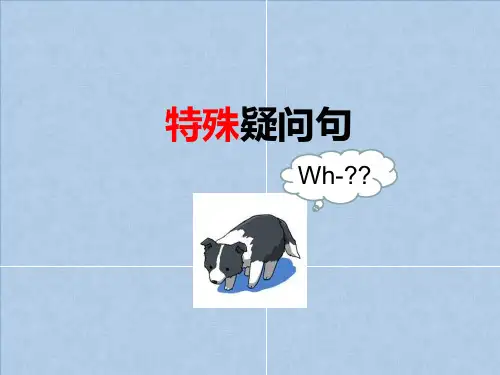
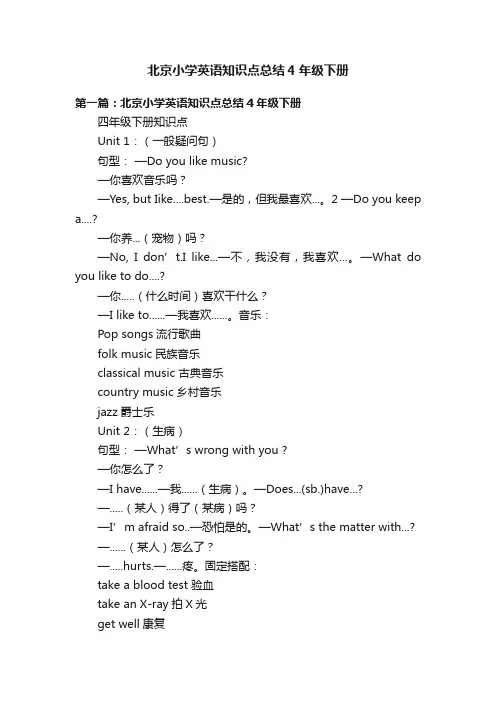
北京小学英语知识点总结4年级下册第一篇:北京小学英语知识点总结4年级下册四年级下册知识点Unit 1:(一般疑问句)句型:—Do you like music?—你喜欢音乐吗?—Yes, but Iike....best.—是的,但我最喜欢...。
2 —Do you keep a....?—你养...(宠物)吗?—No, I don’t.I like...—不,我没有,我喜欢...。
—What do you like to do....?—你.....(什么时间)喜欢干什么?—I like to......—我喜欢......。
音乐:Pop songs流行歌曲folk music民族音乐classical music 古典音乐country music乡村音乐jazz爵士乐Unit 2:(生病)句型:—What’s wrong with you ?—你怎么了?—I have......—我......(生病)。
—Does...(sb.)have...?—.....(某人)得了(某病)吗?—I’m afraid so..—恐怕是的。
—What’s the matter with...?—......(某人)怎么了?—.....hurts.—......疼。
固定搭配:take a blood test 验血take an X-ray拍X光get well康复take it easy 放轻松Unit 3:(问路)句型:—Excuse me, where is....?—打扰一下,请问......在哪?—It’s.......—它在......。
—Where can I find.....?—我在哪里可以找到.......?—It's......—在......3 —Can you tell me the way to.....?—可以告诉我去......的路吗?—Please..., and then...—请先......,然后再......。
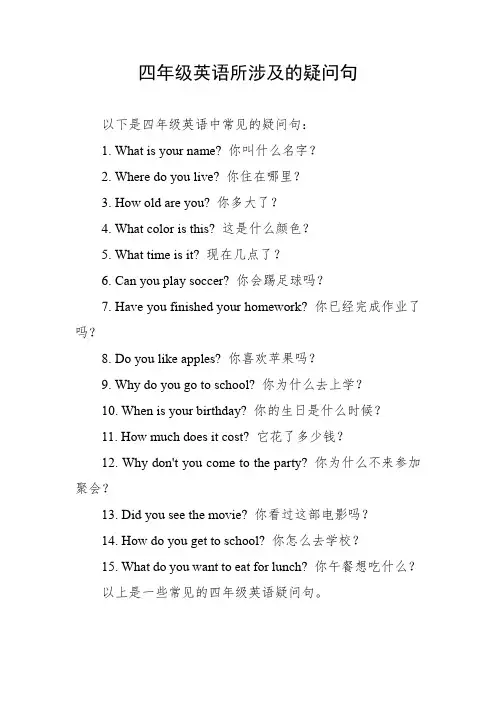
四年级英语所涉及的疑问句
以下是四年级英语中常见的疑问句:
1. What is your name? 你叫什么名字?
2. Where do you live? 你住在哪里?
3. How old are you? 你多大了?
4. What color is this? 这是什么颜色?
5. What time is it? 现在几点了?
6. Can you play soccer? 你会踢足球吗?
7. Have you finished your homework? 你已经完成作业了吗?
8. Do you like apples? 你喜欢苹果吗?
9. Why do you go to school? 你为什么去上学?
10. When is your birthday? 你的生日是什么时候?
11. How much does it cost? 它花了多少钱?
12. Why don't you come to the party? 你为什么不来参加聚会?
13. Did you see the movie? 你看过这部电影吗?
14. How do you get to school? 你怎么去学校?
15. What do you want to eat for lunch? 你午餐想吃什么?
以上是一些常见的四年级英语疑问句。
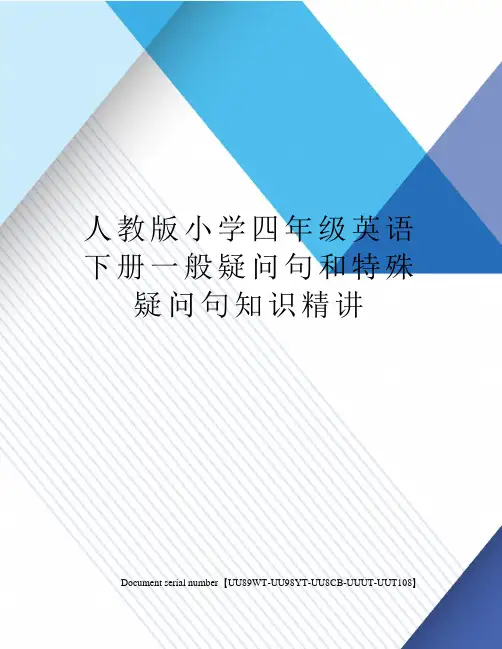
人教版小学四年级英语下册一般疑问句和特殊疑问句知识精讲Document serial number【UU89WT-UU98YT-UU8CB-UUUT-UUT108】PEP小学四年级英语下册《一般疑问句和特殊疑问句知识精讲》(一)疑问句可再分为一般疑问和特殊疑问两种。
(一).一般疑问:用be或助动词或情态动词置于句首,并以肯定回答“Yes,…”,或否定回答“No,…”或相当于yes / no回答的问句称为一般疑问句.1. 含系动词be的一般疑问句的构成具体地说,am 只能跟在第一人称的单数 I 后面,are 搭配 you ,we ,they等, ,is 跟在第三人称单数 he, she ,it后面,而be 动词的基本意思:是如:This is my computer. →Is this your computer (如遇第一人称,最好将其置换成第二人称,即将“我的”要换成“你的”) It's a map. →Is it a map而对于一般疑问句和特殊疑问句的回答分为两种,即肯定回答和否定回答。
如:Is it your bike肯定回答:Yes, it is.否定回答:No, it isn’t.Are they your shoes肯定回答:Yes, they are.否定回答:No, they are n’t.2.含助动词Do或Does的一般疑问句的构成Do与you,I,we连用,Does与he,she和it连用。
如:Do you have lunch at school肯定回答:Yes, I do.否定回答:No, I don’t.3. 含情态动词的一般疑问句的构成一般疑问句面前人人平等:情态动词与am / is / are一样,也可直接将它们提至主语前,所以问题迎刃而解了。
如:I can do it. →Can you do it肯定回答:Yes,I can.否定回答:No, I can’t.(记住在改成一般疑问句时应该将第一人称改成第二人称)Can I wear my new shirt today肯定回答:Yes,you can.否定回答:No, you can’t.4. 小插曲:一般疑问句的语调大部分的一般疑问句都应读作升调(↗),并落在最后一个单词身上。
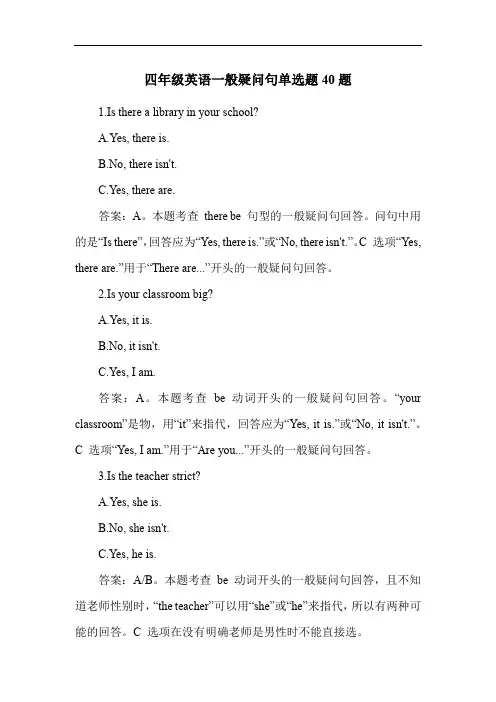
四年级英语一般疑问句单选题40题1.Is there a library in your school?A.Yes, there is.B.No, there isn't.C.Yes, there are.答案:A。
本题考查there be 句型的一般疑问句回答。
问句中用的是“Is there”,回答应为“Yes, there is.”或“No, there isn't.”。
C 选项“Yes, there are.”用于“There are...”开头的一般疑问句回答。
2.Is your classroom big?A.Yes, it is.B.No, it isn't.C.Yes, I am.答案:A。
本题考查be 动词开头的一般疑问句回答。
“your classroom”是物,用“it”来指代,回答应为“Yes, it is.”或“No, it isn't.”。
C 选项“Yes, I am.”用于“Are you...”开头的一般疑问句回答。
3.Is the teacher strict?A.Yes, she is.B.No, she isn't.C.Yes, he is.答案:A/B。
本题考查be 动词开头的一般疑问句回答,且不知道老师性别时,“the teacher”可以用“she”或“he”来指代,所以有两种可能的回答。
C 选项在没有明确老师是男性时不能直接选。
4.Is there a playground in your school?A.Yes, there is.B.No, there isn't.C.Yes, there are.答案:A。
本题考查there be 句型的一般疑问句回答。
问句中用的是“Is there”,回答应为“Yes, there is.”或“No, there isn't.”。
C 选项“Yes, there are.”用于“There are...”开头的一般疑问句回答。
四年级英语一般疑问句的构成及回答单选题40题1.Is there a library in your school?Yes,there is.No,there isn't.答案:Yes,there is.( 如果学校有图书馆就回答Yes,there is.如果没有就回答No,there isn't.)。
本题考查there be 句型的一般疑问句及回答。
there be 句型的一般疑问句将be 动词提前,回答用Yes,there is.或No,there isn't.2.Are there many books in the library?Yes,there are.No,there aren't.答案:Yes,there are.( 如果图书馆有很多书就回答Yes,there are.如果没有就回答No,there aren't.)。
本题考查there be 句型的一般疑问句及回答。
there be 句型的一般疑问句将be 动词提前,回答用Yes,there are.或No,there aren't.3.Is your classroom big?Yes,it is.No,it isn't.答案:Yes,it is. 如果教室大就回答Yes,it is.如果不大就回答No,it isn't.)。
本题考查含有be 动词的一般疑问句及回答。
be 动词is 放在句首,主语是your classroom,回答用it 代替。
4.Are the desks and chairs new?Yes,they are.No,they aren't.答案:Yes,they are. 如果桌椅是新的就回答Yes,they are.如果不是就回答No,they aren't.)。
本题考查含有be 动词的一般疑问句及回答。
be 动词are 放在句首,主语是the desks and chairs,回答用they 代替。
四年级英语疑问句单选题30题1. Is there a library in your school?A. Yes, there is.B. No, there isn't.C. Yes, there are.答案:A。
本题考查there be 句型的一般疑问句回答。
there is 用于单数,there are 用于复数,问句中用的是there is,所以回答用Yes, there is. 选项B 是否定回答,符合没有图书馆的情况。
选项C 中的there are 与问句中的there is 不匹配。
2. Do you have music class on Mondays?A. Yes, I do.B. No, I don't.C. I don't know.答案:A。
这是一般疑问句,用do 提问,回答用do 相关形式。
肯定回答是Yes, I do. 表示有音乐课。
选项B 否定回答,意思是没有音乐课。
选项C 不符合一般疑问句的回答方式。
3. Can you play football on the playground?A. Yes, I can.B. No, I can't.C. Maybe.答案:A。
can 引导的一般疑问句,回答用can 相关形式。
肯定回答Yes, I can. 表示能在操场踢足球。
选项B 否定回答,意思是不能。
选项C“Maybe.”不符合一般疑问句的明确回答要求。
4. Are the classrooms big and clean?A. Yes, they are.B. No, they aren't.C. I'm not sure.答案:A。
本题考查一般疑问句的回答。
主语是the classrooms,复数,用are 提问,回答用are 相关形式。
肯定回答Yes, they are. 表示教室又大又干净。
选项 B 否定回答,意思是教室不大不干净。
四年级英语疑问句单选题40题1.Is this your pencil?A.Yes,it is.B.No,it isn't.C.Maybe.答案:A。
这是一个一般疑问句,询问“这是你的铅笔吗?”。
A 选项“是的,它是。
”符合题意;B 选项“不,它不是。
”在否定回答时使用;C 选项“可能。
”不是对一般疑问句的正确回答。
一般疑问句通常用yes 或no 来回答。
2.Are you a student?A.Yes,I am.B.No,I'm not.C.I don't know.答案:A。
此句询问“你是一名学生吗?”。
A 选项“是的,我是。
”正确;B 选项“不,我不是。
”在否定回答时用;C 选项“我不知道。
”不是一般疑问句的合适回答。
一般疑问句用be 动词开头时,回答也用be 动词。
3.Is there a library in your school?A.Yes,there is.B.No,there isn't.C.Sorry,I don't know.答案:A。
这句问“你的学校有图书馆吗?”。
A 选项“是的,有。
”正确;B 选项“不,没有。
”为否定回答;C 选项不是对一般疑问句的标准回答。
there be 句型的一般疑问句,回答用there be 的相应形式。
4.Are they your friends?A.Yes,they are.B.No,they aren't.C.Maybe.答案:A。
此问题是“他们是你的朋友吗?”。
A 选项“是的,他们是。
”符合;B 选项“不,他们不是。
”用于否定回答;C 选项不合适。
一般疑问句的回答要明确。
5.Is it sunny today?A.Yes,it is.B.No,it isn't.C.I'm not sure.答案:A。
“今天天气晴朗吗?”。
A 选项“是的,晴朗。
”正确;B 选项“不,不晴朗。
四年级英语疑问句练习题30题1.Is this your pencil?A.Yes,it is.B.No,it isn't.C.It's a pencil.答案:A。
本题考查一般疑问句的回答。
一般疑问句以be 动词开头,回答用“Yes/No”。
问句中“this”在回答中用“it”代替,“Is this”的肯定回答是“Yes,it is.”。
2.Are you a student?A.Yes,I am.B.No,I'm not.C.I'm a teacher.答案:A。
一般疑问句“Are you”的肯定回答是“Yes,I am.”,否定回答是“No,I'm not.”。
根据题干问“你是一名学生吗”,可根据实际情况回答。
3.Is there a library in your school?A.Yes,there is.B.No,there isn't.C.There is a library.答案:A。
“Is there”开头的一般疑问句,肯定回答“Yes,there is.”,否定回答“No,there isn't.”。
根据实际学校情况判断是否有图书馆。
4.Are these your books?A.Yes,they are.B.No,they aren't.C.They are books.答案:A。
“Are these”的肯定回答是“Yes,they are.”,否定回答是“No,they aren't.”。
“these”在回答中用“they”代替。
5.Is he your teacher?A.Yes,he is.B.No,he isn't.C.He is a teacher.答案:A。
“Is he”开头的一般疑问句,肯定回答“Yes,he is.”,否定回答“No,he isn't.”。
根据实际情况判断他是否是你的老师。
四年级英语疑问句单选题40题1.Is this your pencil? A.Yes,it is. B.No,it isn't. C.Maybe.答案:A。
这是一个一般疑问句,问“这是你的铅笔吗?”。
回答用“Yes,it is.”表示“是的,它是。
”;“No,it isn't.”表示“不,它不是。
”。
根据一般疑问句的回答规则,用be 动词提问就用be 动词回答。
2.Are you a student? A.Yes,I am. B.No,I'm not. C.I don't know.答案:A。
“你是一名学生吗?”,回答“Yes,I am.”( 是的,我是。
)或“No,I'm not.”( 不,我不是。
)。
同样是用be 动词提问用be 动词回答。
3.Is there a library in your school? A.Yes,there is. B.No,there isn't.C.Sometimes.答案:A。
“你的学校有图书馆吗?”,“Yes,there is.”表示“有”,“No,there isn't.”表示“没有”。
一般疑问句用there be 句型提问,用there be 句型回答。
4.Are these your books? A.Yes,they are. B.No,they aren't. C.Maybe they are.答案:A。
“这些是你的书吗?”,用be 动词are 提问,回答“Yes,they are.”( 是的,它们是。
)或“No,they aren't.”( 不,它们不是。
)。
5.Is he your teacher? A.Yes,he is. B.No,he isn't. C.I'm not sure.答案:A。
“他是你的老师吗?”,回答“Yes,he is.”( 是的,他是。